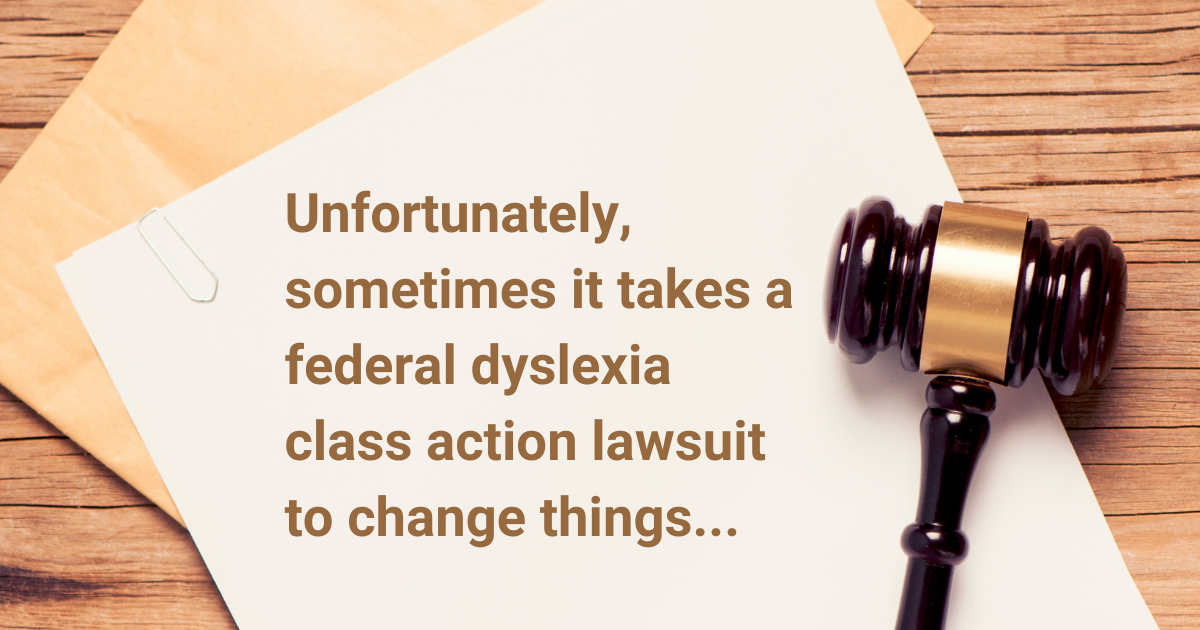BLOG UPDATE: Watch the interview on our DDCA YouTube Channel.
On July 8, 2021, a proposed settlement was agreed to in a class action case filed on May 2, 2017, by four current and former Berkeley Unified School District (“BUSD”) students with reading disorders, including dyslexia (Student A. et al. v. Berkeley Unified School District was filed in the federal court for the Northern District of California, Case No. 3:17-cv-02510). The Court has given preliminary approval of the settlement and has scheduled a hearing for November 4, 2021 at 2:00 p.m.
The students who brought the case claim that BUSD discriminates against and fails to provide students with reading disabilities a Free Appropriate Public Education (“FAPE”), to which they are entitled to under federal and state law.
As a result of this settlement, BUSD will work collaboratively with nationally recognized outside consultants to develop and implement a Literacy Improvement Plan (“Plan”) to improve reading and language arts achievement for all students, and especially those with or at risk for reading disabilities.
Settlement to Accomplish Four Plan Goals:
- Goal 1: Develop Programs to Improve General Education Reading and Language Arts achievement for all Students, especially those Students with or at risk for Reading Disabilities, including Dyslexia.
- Goal 2: Increase the Systematicity and Intensity of Tier 2 and 3 Reading and Language Arts Intervention of the MTSS Framework to Reduce the Achievement Gap for Students at risk for Reading Disabilities.
- Goal 3: Ensure Fidelity of Literacy Improvement Program Implementation through District Monitoring of Literacy Improvement Program and Staff Engagement.
- Goal 4: Special Education Programs: Increase Reading Achievement by Improving the Quality of IEP Goals and Section 504 Plan Development, Progress Monitoring, and use of appropriately intensive, Research-based Interventions.
Settlement Highlights Include:
- BUSD will identify students at risk for reading disabilities through universal screening and universal screening will inform early intervention. BUSD will also conduct Benchmark Assessments in the fall, winter, and spring to ensure reading growth for all students. BUSD to implement a “reading data system” and “reading testing system” for use in Grades K-8 to measure students’ reading fluency, and their progress toward “benchmarks” or academic goals including parental notification. Testing will include, but not be limited to, letter sound correspondence, diagnostic surveys of print knowledge, phoneme awareness, phonics, word reading, spelling, written expression, and reading fluency.
- For its Multi-Tiered System of Supports (MTSS) –
°BUSD has selected FastTrack as a supplement to its core language arts program (Tier 1). According to the scope and sequence for the adopted program, BUSD will provide appropriately intensive research-based phonics instruction at a frequency estimated to be at least 115 minutes per five-day week, including time spent conducting assessments. Its core reading program will be supplemented to be of appropriate intensity in terms of academic English and explicit phonics and phoneme awareness instruction. Language for Learning, Language for Thinking, Wilson Fundations, Systematic Instruction in Phonological Awareness and Phonics – SIPPS and FastTrack are programs named as examples.
°Tier 2 and Tier 3 reading interventions must align with the International Dyslexia Association’s Knowledge and Practice Standards for Teachers of Reading. BUSD has selected Wilson Reading Systems and, for students with suspected reading disabilities, will prohibit the use of Fountas & Pinnell Leveled Literacy Intervention or Reading Recovery except in “exceptional circumstances”.
- Special Education Programs – BUSD will transition from using the severe discrepancy model and adopt the Pattern of Strengths and Weaknesses Model Weaknesses for specific learning disability eligibility. BUSD will increase use of the MTSS as part of the comprehensive evaluation to identify students with specific learning disabilities, including dyslexia.
- The settlement includes regular outside monitoring, hiring of nationally-recognized outside consultants, and professional development for staff and administrators.
Thank you to the team of plaintiff’s attorneys (Jacobson Education Law, Disability Rights Education & Defense Fund, Goodwin Procter LLP, and King & Spalding LLP) who tirelessly worked on an either pro bono basis or at a mere fraction of their legal fees to represent these vulnerable families.


